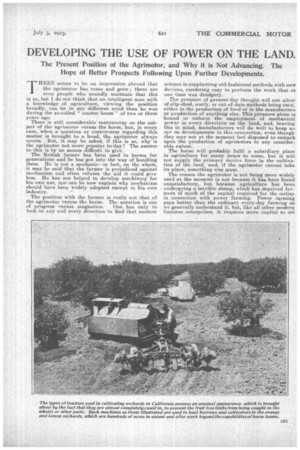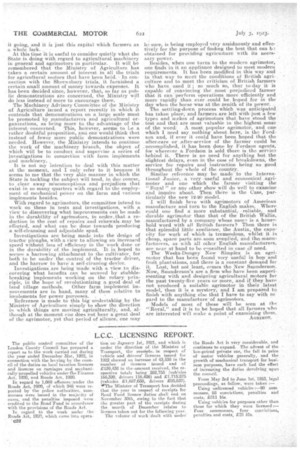DEVELOPING THE USE OF POWER ON THE LAND.
Page 11

Page 12

If you've noticed an error in this article please click here to report it so we can fix it.
The Present Position of the Agrimotor, and Why it is Not Advancing. The Hope of Better Prospects Following Upon Further Developments.
THERE seems to be an impression abroad that the agrimotor has come and gone ; there are even people who soundly maintain that this is so, but I do not think that an intelligent man with a knowledge of agriculture, viewing the position broadly, can be in any different mind than he was during the so-coiled " tractor boom" of two OT three years ago.
There is still considerable controversy on the subject of the agrimotor versus the horse, but, in every. case, when a question or controversy regarding this matter is brought to a head, the agrimotor always scores. But, it ,may be asked, if this is so, why is the agrimotor not more popular to-day? The answer • to this is by no means difficult to give. The British farmer has been Used to horses for generations and he has got into the way of handling them. He is not a. mechanic—in fact, on the whole, it may be said that the farmer is prejudiced against mechanism and often refuses the aid it could give him. He has not helped to develop machinery for his own use, nor can he now explain why mechanism should have been Widely adopted except in his own industry.
' The position with the farmer is re-ally not that of the agrimotor versus the horse. The question is one of progress versus stagnation. One has only to look in any and every direction to find that modern science is. supplanting old-fashioned methods with new devices, rendering easy to perform the work that at one time was drudgery.
The pressure of present-day thought will not allow of slip-shod, costly, or out-of-date methods being used, either in the production of food or in the manufacture or production of anything else. This pressure alone is bound to enforce the employment of mechanical power in every direction on the land, and, bearing this in mind, manufacturers will do well to keep an eye on developments in this connection, even though they may not at the moment feel disposed to embark upon the production of agrimotors to any considerable extent.
The horse will probably fulfil a subsidiary place in agriculture for many years to come, but it will not supply the primary motive force in the cultivation of the land 'a n d, if the agrimotor cannot take its place, something else must.
The reason the agrimotor is not being more widely used at the moment is not because it has been found unsatisfactory, but because agriculture has been undergoing a terrible slump, which has deprived farmers of much of the capital required for the outlay in connection with power farming. . Power -farming pays better than the ordinary every-day farming as we generally understand it, but, like all other modern business enterprises, it requires more capital to set it going, and it is just this capital which farmers as a whole lack...
At this time it is useful to consider quietly what the State is doing with regard to agricultural machinery in general and agrimotors in particular. It will be remembered that the Ministry of Agrieolture has taken a certain amount of interest. in all the trials for agricultural motors that have been held. In connection with the Shrewsbury trials, it furnished a certain small amount of money towards expenses. It . has been decided since, however, that, so far as public demonstrations are concerned, the Ministry will do less instead of more to encourage them..
The Machinery Advisory Committee of die Ministry of Agriculture issued a report recently in which it contends that demonstrations on a large scale must be promoted by manufacturers and agricultural organizations, as being More to.the advantage of the
interest. concerned. This, however, seems to Le a rather doubtful proposition, and one would think that instead of fewer more public demonstrations were needed. However, the Ministry intends to .continue the work of the machinery branch, the object . of which will be to conduct and supervise a series of investigations in connection with farm implements and machinery. ,
It is not my intention to deal with this matter at the moment, and I only refer to it because it seems to me that the very able manner in which the State is tackling the subject will tend, in due course, to clear away misconceptions and prejudices that exist in so many quarters with regard to the
employnnt of mechanical power on the farm and various implements besides.
With regard to agrimotors, the committee intend to work on these in tests and investigations, with a view to discovering what improvements can be made in the durability of agrimotors, in orderethat a reduction in the cost of repairs and renewals-may be effected, and what can be done towards • producing a self-cleansing and adjustable spud.
Investigations are being made into the design of traeror ploughs, with a view to allowing an increased speed without loss of efficiency in the work done or in the durability of, the. implement. It is hoped to secure a harrowing attachment to the cultivator, for both to be under the, control of the tractor driver, and the harrow to have: a self-cleaning AleV:Ce.
Investigations are being 'made with a view to discovering what benefits can be secured by stubblebreaking implements working on the rotary principle, in the hope of revolutionizing a good deal of land tillage methods. Other farm implement immovements are in hand, many of them relative to
imnlements for power purposes. . •
Reference is made to this big undertaking by the ,Ministry of Agriculture simply to show the direction in which things are moving agriculturally, and, although at the moment one &es not hear a great deal of the agrimotor, yet that period of silence, one may
he sure, is being employed very assiduously and effectively for the purpose of finding the best that can b.) obtained for providing agricuiture with its necessary power.
Besides when one turns to the modern agrimotor, one findsAn it an appliance desigoed to meet modern requirements. It has-been modified in this way and in that way to meet the conditions of British agriculture and to meet the criticism of British farmers who have, used it so much So, that to-day it is capable of ,convincing the most prejudiced farmer that it can perform Operations more efficiently and more rapidly than over could be hoped for in the day when the horse was at the zenith of its power.
The settling-down process which was anticipated has taken place; and farmers are left With just a few types and makes of agrimotors that have stood the test and that are most valuable in the highest sense of the word: A most popular agrimotor, and one which I need say nothing about here, is the Fordson and, if ever it could have been hoped that the after-care or ,after-service of the farmer could be accomplished, it has been done by Fordson agents, foi. wherever a Fordson is sold there is the service behind it. There is no need for anything but the slightest delays, even in the. case of breakdowns, the service for repairs and instruction being so good throughout the whole of the country.
Similar reference may, be made to the International Junior, a very useful and economical .agrimotor and one which the farmer visiting the "Royal " or any other show will do well to examine and inquire about. Then there is the Case, particularly the new 12-20 model.
I will finish here with agrimotors of American manufacture and turn to the English makes. Where could one .find a more substantial, reliable, and durable agrimotor than that of the British Wallis, manufactured by a company whose name is a household word with all British farmers Then there is that splendid little annlianc.e, the Austin, the capacity for work of which is tremendous, whilst it is cheap, spare parts are soon snoplied, and the) manufacturers, as With all other English manufacturers, are near at hand to be consulted in case df need.
The Weeks-Dungey New Simplex is an agrimotor that has been found very useftil in hapand fruit plantations, and there is a constant demand for it. Last, but not least, conies the New Sannelerson. Now, Saunderson's are a firm who have been experimenting with and designing agricultural motors for the past twenty-five years or more, and if they have not produced a suitable agrimotor in their latest model, then it is a mystery, and I am prepared to finish with anything else that I have to say with re gard to the manufacture of agrimotors.
Models of most of these will he seen at the "Royal," and it is to be hoped that all farmers who are interested will make a. point of examining them. AGRIMOT.














































